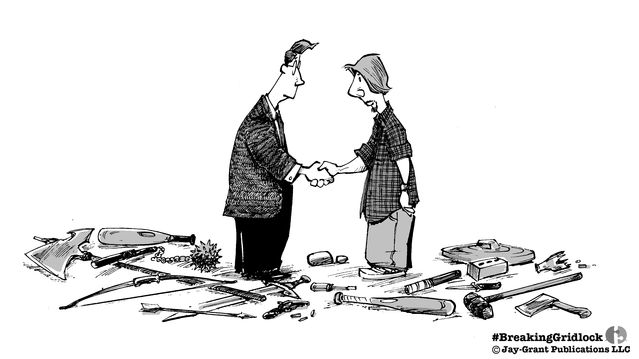
Environment
How to Wield the Power of Vulnerability
Break through gridlock in polarized conversations that have otherwise run afoul.
Posted October 18, 2017
In polarized conversations, vulnerability can be powerful.
Think about the last time you tried to have a conversation with someone who didn’t already agree with you. The topic could be related to politics, the environment, or something personal. How well did it go?
We have posed this question to hundreds of people via workshops at universities, conferences, and purpose-driven organizations. Here is one story we heard from Laura, a recent environmental studies graduate, which we’ve excerpted from our new book, Breaking Through Gridlock: The Power of Conversation in a Polarized World.
We were less than a week away from graduating from college, on a seaside vacation to celebrate the past four years together, when the conversation moved to the topic of climate change. One of my closest friends said he thought scientists were just trying to scare everyone into changing their behavior. I snapped, and yelled at him for not believing in science. I refused to listen to anything he had to say. I ended the conversation abruptly by saying, “This is BS. I don’t want to talk about this with you at all.” Everyone froze, and got really quiet. The rest of the trip was really uncomfortable.
All too often, conversations get stuck. Armed with rehearsed talking points, we go into battle, doing our best to deflect arguments from the other side. Sometimes we lose our cool. Other times we‘re so battle-weary we avoid hard topics and stick to small talk. When we walk away, we may initially feel a sense of righteousness, but in many cases we feel frustrated and powerless.
The reality is that we do have power in these conversations, if we understand power in the right way.
Our default idea is that power is about strength: impervious arguments, indisputable facts, and being more right, righteous, and certain than the other person. From this perspective, Laura would approach her next conversation by securing more data, graphs, and counter-arguments for each talking point her friend could bring to the fight.

On further reflection in our workshop, Laura conceived of another pathway. She found a power that comes from dropping your weapons. She wrote her friend a letter, called him, and read it aloud:
I wanted to talk to you and apologize for the way I acted on vacation…I wasn’t being open-minded or a true friend—I was acting in an aggressive, dismissive manner that isn’t characteristic of the type of friend or person I want to be.
I want to acknowledge now…that there is uncertainty in climate science…The uncertainty scares me because it threatens the choices I’ve made in my life so far. Instead of being authentic and acknowledging the uncertainty, I purposefully diminished the value of what you were saying, asserting that I was right and you were wrong...
If I’d been speaking from a place of friendship and love, what I should have said is this: There is some uncertainty about climate change science. Uncertainty is inherent in the scientific process. I hope that the predictions aren’t as bad as people say. However, I do think it’s important for us as humans to understand the impact we have and take countermeasures in case we are causing these changes in the natural environment, which is why I’ve chosen to work and study in this field.
I hope you feel comfortable telling me and holding me accountable if I flip out like that again…I want to let you know I really value our friendship and I sincerely apologize for acting in a way that didn’t show you how much your friendship means to me.
Admitting to uncertainty and apologizing is not easy. Laura succeeded in expressing her genuine desire to connect and relate to her friend and in sharing why she’s chosen to work and study in environmental leadership. Sharing this combination felt powerful. We were intensely curious to know the outcome.
My friend was quick to tell me he felt some guilt about the way he was being during our original conversation. He expressed an interest in learning more about climate change because it was something I was passionate about. He joked that we’re both pretty passionate people and it wasn’t surprising to him that we’d gotten in an argument in the first place…
Since this conversation took place, in conversations with my uncle, my grandparents, my coworkers, professors, and others, I’ve made a conscious effort to engage them with compassion and understanding. Conversations that I previously would have avoided have since become so productive!
Consider that the armor and shield may have their place, but another approach exists:
- Share an apology for any past damage you’ve done.
- Share what you care about including both the issue and the relationship.
- Share whatever uncertainty and ambivalence you may have been harboring.
In doing so, you will create a space for the other person to reciprocate. And that is the beginning of a mutually empowering conversation.

